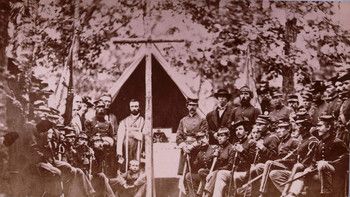 Southern Baptist newspapers weekly report on the revivals taking place within the Confederate Army and in the Baptist churches of the South, frequently celebrating spiritual victories as a prelude to ultimate military triumph over the United States.
Southern Baptist newspapers weekly report on the revivals taking place within the Confederate Army and in the Baptist churches of the South, frequently celebrating spiritual victories as a prelude to ultimate military triumph over the United States.
Revivals, however, are not confined to the Confederacy. Although the Northern press may not evidence as much intensity in highlighting spiritual awakenings taking place in Union Army camps and local congregations, revivals in the North are nonetheless happening with a frequency and intensity similar to that of the South. The constant specter of death, after all, hangs low upon both North and South, an ever present reminder of the thin line between this life and the next.
Regardless, Baptist newspapers of the South, ever apologists for the Confederacy, waste few opportunities to denigrate the religiosity evident in the North, as illustrated once again by this week’s Virginia Baptist Religious Herald:
A letter writer from New Hampshire says: “It is more and more believed that the camp meeting has come to take the place of the old militia muster. The speakers seem to have lost the unction and pathos which used to bring sinners to repentance in the older times, and the people expend their energies in getting up comfortable arrangements–tents, seats, tables, etc., for the good of the outer man. It may be different in other States, but the spirit of secularity seems to pervade such meetings in the State. People go to have a good time, as they say, and return complaining that they have had a very dull time.”
For Baptists of the South, bringing “sinners to repentance” yet remains the pinnacle of one’s calling. Following close behind the saving of souls, however, is the saving of the Confederacy, a task which is now far more difficult and complicated than in the first two years of the war. One part of the equation gaining traction in recent months in Baptist newspapers of the South is that of the fate of the children of soldiers, often orphaned. This week’s Christian Index reminds the paper’s readers of the danger and promise represented by these young charges:
We published in our last issue, a communication from Bro. Campbell in regard to the education of soldiers’ children, and this week we call attention to the subject as one of great importance; and we desire to express our ardent hope that some early and active steps will be taken toward educating the many soldiers’ children who might otherwise waste the best portion of their lives in idleness and grow up in ignorance. This is a sacred duty incumbent upon us as patriots and as a christian and civilized people. Indeed, the blush of shame should mantle our cheeks when we reflect that our very enemies, while they are carrying on a deadly war against us, have established schools for our runaway negroes in South Carolina, Florida and Mississippi. This may be but an exhibition of a fanatical spirit–the ebullition of a semi-monomaniacism–but still it evinces a spirit that is willing to sacrifice time, labor, comfort and money to what is esteemed the advancement of the human race! Shall we, who are so indebted to the brave defenders of our soil, neglect their families and children, especially when those defenders are our friends and kindred? The future of the Confederacy requires that this noble duty be performed. The time will, ere long, arrive, when every stripling that now follows the plow, or cons his lesson in “the old field school,” or, mayhap, wanders hither and thither in idleness, will aid to the full extent of his influence in shaping the destiny of our Republic or moulding its institutions and history; they are to be our statesmen, legislators and Governors; they will give the form and consistency to our society which it shall possess; they will aid in elevating our land high in the roll of nations, or assist in bringing upon it contumely and contempt. To fit them for the position they are to occupy should, therefore, occupy the serious attention and receive the hearty support of our legislators and of those whose business it is, or whose privilege it may be, to look after the moral and intellectual interests of the poor.
Let not posterity say that we neglected this great duty and entailed, thereby, miserable consequences upon the country for which we are making so many other sacrifices.
Alluded to within this admonition is an tacit admission that the war is rich man’s war but a poor man’s fight. Illiterate African slaves are fine (after all, ignorance is God’s lot for blacks), but woe be it if too many hundreds of thousands of orphaned, impoverished, illiterate white youth and young men should be roaming the Southern countryside following the Confederacy’s victory over the United States.
Sources: Steven E. Woodworth, “Religious Revivals During the Civil War,” Encyclopedia Virginia (link); “Education of Soldiers’ Children,” Christian Index, January 15, 1864; “Camp Meeting,” Religious Herald, January 14, 1864


